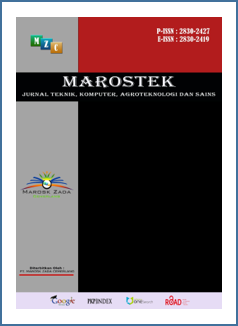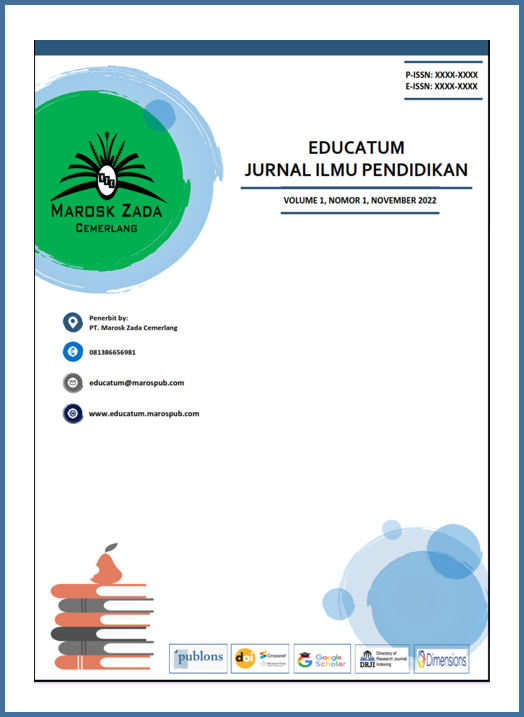Vocabulary Learning Strategies Using By Students’ During Covid-19 Pandemic
DOI:
https://doi.org/10.56248/educativo.v2i2.122
Keywords:
learning strategies, contributing factors, vocabulary improvement
Abstract
The purpose of this study is to describe strategies for mastering English, the main thing that usually has to be mastered is Vocabulary. This type of research is a qualitative approach. Data obtained from observation, interviews and documentation. The subjects of this study were second semester students of the English study program at IAIN Palangka Raya. Then, the object of this research is learning strategies and also factors that contribute in increasing the vocabulary used by English students. They were selected by purposive sampling technique. Interviews were used to determine learning strategies and contributing factors in increasing students' vocabulary. The findings of this study indicate the following points: (1) students use strategies to increase vocabulary, especially during the Pandemic. The strategies include: direct strategies, namely memory strategies, cognitive strategies and compensation strategies. While the indirect strategies are metacognitive, affective strategies and social strategies. Although there are several strategies in learning, here the informants only use cognitive, memory, and metacognitive strategies. Each student has a different strategy that is tailored to their own desires. This strategy is very helpful for students because they can adapt it to their preferred way of learning. (2) in increasing students' vocabulary, there are also contributing factors. The chosen factor is also the same as choosing a learning strategy, because this factor also has a role that is almost the same as the strategy. These factors are usually used when they are studying, namely when they have free time so that even though they are relaxed, they can still get vocabulary.
References
Al-Faris, S., & Jasim, B. Y. (2021). Memory Strategies and Vocabulary Learning Strategies: Implications on Teaching and Learning Vocabulary. Journal of Humanities and Social Sciences Studies, 3(10), 11-21
Batubara, H. S., Riyanda, A. R., Novendra, R., Lapisa, R., & Dakhi, O. (2023, May). Check for updates Implementation of Blended Learning Model to Improve Critical Thinking Ability of Audio Visual Engineering Students. In Proceedings of the 9th International Conference on Technical and Vocational Education and Training (ICTVET 2022) (Vol. 747, p. 74). Springer Nature.
Brezina, V., & Gablasova, D. (2023). A Frequency Dictionary of British English: Core Vocabulary and Exercises for Learners. Taylor & Francis
Dakhi, O. (2022). Pengembangan Model Self-blend Learning Paket Keahlian Teknik Komputer dan Jaringan berbasis Website pada Sekolah Menengah Kejuruan (Doctoral dissertation, Universitas Negeri Padang).
Dakhi, O., Irfan, D., Jama, J., Ambiyar, A., Simatupang, W., Sukardi, S., & Zagoto, M. M. (2022). Blended Learning And Its Implications For Learning Outcomes Computer And Basic Networks For Vocational High School Students In The Era Of COVID-19 Pandemic. International Journal of Health Sciences, 6.
Elbes, E. K., & Oktaviani, L. (2022). Character Building in English for Daily Conversation Class Materials for English Education Freshmen Students. Journal of English Language Teaching and Learning, 3(1), 36-45.
Khalili, H. (2020). Online Interprofessional Education During and Post The COVID-19 Pandemic: a Commentary. Journal of Interprofessional Care, 34(5), 687-690.
Laoli, A., Dakhi, O., & Zagoto, M. M. (2022). The Application of Lesson Study in Improving the Quality of English Teaching. Edukatif: Jurnal Ilmu Pendidikan, 4(2), 2238-2246.
Lee, J., & Heinz, M. (2016). English Language Learning Strategies Reported By Advanced Language Learners. Journal of International Education Research, 12 (2), 67-76.
Sembiring, J., Ambiyar, A., Verawardina, U., Edi, F., & Dakhi, O. (2022). Mobile Learning: Learning Tools in the Era of Industrial Revolution 4.0. Edumaspul: Jurnal Pendidikan, 6(2), 3217-3224.
Schmitt, N., & Schmitt, D. (2020). Vocabulary in Language Teaching. Cambridge university press.
Timor, A. R. (2023, May). Development of Self-blend Learning Model for Computer and Network Engineering Expertise Package Based on Website in Vocational High Schools. In Proceedings of the 9th International Conference on Technical and Vocational Education and Training (ICTVET 2022) (Vol. 747, p. 249). Springer Nature.
Tunga, S. G. (2021). Cognitive strategies utilized in reading critically by high and low achievers. Lectio: Journal of Language and Language Teaching, 1(1), 1-12.
Verawardina, U., & Dakhi, O. (Eds.). (2023). Proceedings of the 9th International Conference on Technical and Vocational Education and Training (ICTVET 2022) (Vol. 747). Springer Nature.
Zagoto, M. M., Yarni, N., & Dakhi, O. (2019). Perbedaan Individu Dari Gaya Belajarnya Serta Implikasinya Dalam Pembelajaran. Jurnal Review Pendidikan dan Pengajaran (JRPP), 2(2), 259-265.
Zakariah, M. A., Afriani, V., & Zakariah, K. M. (2020). Metodologi Penelitian Kualitatif, Kuantitatif, Action Research, Research And Development (R n D). Yayasan Pondok Pesantren Al Mawaddah Warrahmah Kolaka.
Downloads
Published
2023-11-05
How to Cite
Rera, E. P., Qalyubi, I., & Qamariah, Z. (2023). Vocabulary Learning Strategies Using By Students’ During Covid-19 Pandemic. Educativo: Jurnal Pendidikan, 2(2), Page 348–354. https://doi.org/10.56248/educativo.v2i2.122
Issue
Section
Artikel
License
Copyright (c) 2023 Ega Prasetya Rera, Imam Qalyubi, Zaitun Qamariah

This work is licensed under a Creative Commons Attribution-ShareAlike 4.0 International License.
DOI:
https://doi.org/10.56248/educativo.v2i2.122Keywords:
learning strategies, contributing factors, vocabulary improvementAbstract
The purpose of this study is to describe strategies for mastering English, the main thing that usually has to be mastered is Vocabulary. This type of research is a qualitative approach. Data obtained from observation, interviews and documentation. The subjects of this study were second semester students of the English study program at IAIN Palangka Raya. Then, the object of this research is learning strategies and also factors that contribute in increasing the vocabulary used by English students. They were selected by purposive sampling technique. Interviews were used to determine learning strategies and contributing factors in increasing students' vocabulary. The findings of this study indicate the following points: (1) students use strategies to increase vocabulary, especially during the Pandemic. The strategies include: direct strategies, namely memory strategies, cognitive strategies and compensation strategies. While the indirect strategies are metacognitive, affective strategies and social strategies. Although there are several strategies in learning, here the informants only use cognitive, memory, and metacognitive strategies. Each student has a different strategy that is tailored to their own desires. This strategy is very helpful for students because they can adapt it to their preferred way of learning. (2) in increasing students' vocabulary, there are also contributing factors. The chosen factor is also the same as choosing a learning strategy, because this factor also has a role that is almost the same as the strategy. These factors are usually used when they are studying, namely when they have free time so that even though they are relaxed, they can still get vocabulary.
References
Al-Faris, S., & Jasim, B. Y. (2021). Memory Strategies and Vocabulary Learning Strategies: Implications on Teaching and Learning Vocabulary. Journal of Humanities and Social Sciences Studies, 3(10), 11-21
Batubara, H. S., Riyanda, A. R., Novendra, R., Lapisa, R., & Dakhi, O. (2023, May). Check for updates Implementation of Blended Learning Model to Improve Critical Thinking Ability of Audio Visual Engineering Students. In Proceedings of the 9th International Conference on Technical and Vocational Education and Training (ICTVET 2022) (Vol. 747, p. 74). Springer Nature.
Brezina, V., & Gablasova, D. (2023). A Frequency Dictionary of British English: Core Vocabulary and Exercises for Learners. Taylor & Francis
Dakhi, O. (2022). Pengembangan Model Self-blend Learning Paket Keahlian Teknik Komputer dan Jaringan berbasis Website pada Sekolah Menengah Kejuruan (Doctoral dissertation, Universitas Negeri Padang).
Dakhi, O., Irfan, D., Jama, J., Ambiyar, A., Simatupang, W., Sukardi, S., & Zagoto, M. M. (2022). Blended Learning And Its Implications For Learning Outcomes Computer And Basic Networks For Vocational High School Students In The Era Of COVID-19 Pandemic. International Journal of Health Sciences, 6.
Elbes, E. K., & Oktaviani, L. (2022). Character Building in English for Daily Conversation Class Materials for English Education Freshmen Students. Journal of English Language Teaching and Learning, 3(1), 36-45.
Khalili, H. (2020). Online Interprofessional Education During and Post The COVID-19 Pandemic: a Commentary. Journal of Interprofessional Care, 34(5), 687-690.
Laoli, A., Dakhi, O., & Zagoto, M. M. (2022). The Application of Lesson Study in Improving the Quality of English Teaching. Edukatif: Jurnal Ilmu Pendidikan, 4(2), 2238-2246.
Lee, J., & Heinz, M. (2016). English Language Learning Strategies Reported By Advanced Language Learners. Journal of International Education Research, 12 (2), 67-76.
Sembiring, J., Ambiyar, A., Verawardina, U., Edi, F., & Dakhi, O. (2022). Mobile Learning: Learning Tools in the Era of Industrial Revolution 4.0. Edumaspul: Jurnal Pendidikan, 6(2), 3217-3224.
Schmitt, N., & Schmitt, D. (2020). Vocabulary in Language Teaching. Cambridge university press.
Timor, A. R. (2023, May). Development of Self-blend Learning Model for Computer and Network Engineering Expertise Package Based on Website in Vocational High Schools. In Proceedings of the 9th International Conference on Technical and Vocational Education and Training (ICTVET 2022) (Vol. 747, p. 249). Springer Nature.
Tunga, S. G. (2021). Cognitive strategies utilized in reading critically by high and low achievers. Lectio: Journal of Language and Language Teaching, 1(1), 1-12.
Verawardina, U., & Dakhi, O. (Eds.). (2023). Proceedings of the 9th International Conference on Technical and Vocational Education and Training (ICTVET 2022) (Vol. 747). Springer Nature.
Zagoto, M. M., Yarni, N., & Dakhi, O. (2019). Perbedaan Individu Dari Gaya Belajarnya Serta Implikasinya Dalam Pembelajaran. Jurnal Review Pendidikan dan Pengajaran (JRPP), 2(2), 259-265.
Zakariah, M. A., Afriani, V., & Zakariah, K. M. (2020). Metodologi Penelitian Kualitatif, Kuantitatif, Action Research, Research And Development (R n D). Yayasan Pondok Pesantren Al Mawaddah Warrahmah Kolaka.
Downloads
Published
How to Cite
Issue
Section
License
Copyright (c) 2023 Ega Prasetya Rera, Imam Qalyubi, Zaitun Qamariah

This work is licensed under a Creative Commons Attribution-ShareAlike 4.0 International License.
















